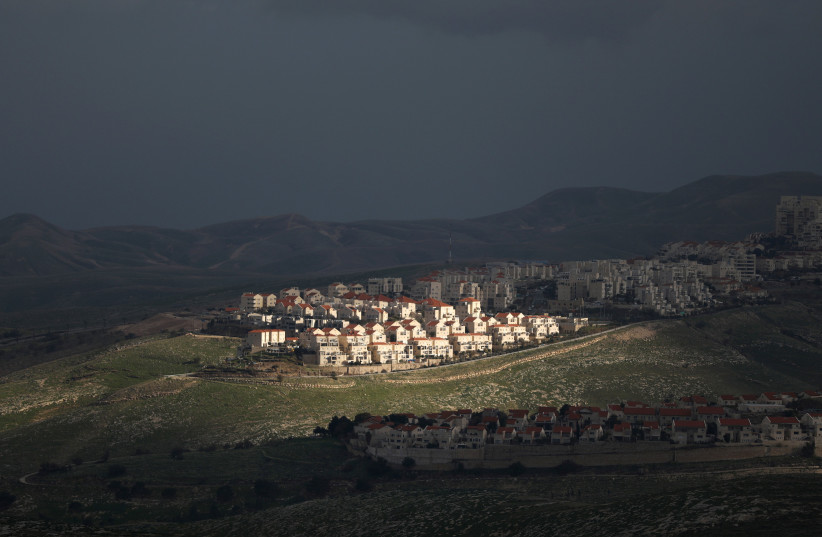Alternate PM and Defense Minister Benny Gantz says fighting coronavirus, unemployment higher priority than peace plan; Netanyahu still talking about sovereignty over all settlements and Jordan Valley
LAHAV HARKOV

Israel will not take steps to extend its sovereignty in the West Bank this week, multiple American sources with knowledge of the matter told The Jerusalem Post in recent days.
The coalition agreement between Likud and Blue and White allows Prime Minister Benjamin Netanyahu to bring sovereignty moves to a vote on Wednesday, July 1 at the earliest, but plans and US approval of them will not be ready by then.
Netanyahu is considering making a statement on the topic of sovereignty on Wednesday, instead.
Alternate Prime Minister and Defense Minister Benny Gantz also told US Special Envoy for International Negotiations Avi Berkowitz and Scott Leith of the National Security Council in a meeting Monday morning that he does not see July 1 “as a holy date,” and that fighting the coronavirus pandemic and bringing down unemployment are higher priorities for him.
Berkowitz and Leith, a member of the US-Israel mapping committee determining which parts of the West Bank will come under Israeli civil law, met with Netanyahu on Saturday night plan to meet with Foreign Minister Gabi Ashkenazi on Tuesday.
Even before the meeting with Gantz, they planned to return to the US without approving specific Israeli action after their meetings for further discussions with Special Adviser to the US President Jared Kushner. US President Donald Trump has not yet weighed in on the matter, as he is currently occupied with domestic US issues like the coronavirus pandemic and ongoing protests across the country, among others.
Each of the three top Israeli officials has a different view on how Israel should proceed, ranging from applying Israeli sovereignty to 30% of the West Bank, including all settlements and the Jordan Valley, as the Trump plan stipulates, to doing so in a smaller amount of the territory, to not taking any such step at the moment and focusing on regional normalization.
Netanyahu gave some indication of his thinking on the matter in a video address to Christians United for Israel (CUFI) on Sunday night, in which he said “Israel will have sovereignty over Bet El, where Jacob dreamed of a ladder going to the heavens and sovereignty over Shiloh where the Ark of the Covenant and the Ten Commandments stood for centuries.” Neither Shiloh nor Bet El are in the settlement blocs, indicating that the prime minister seeks to make a broader sovereignty move.
The prime minister also praised US President Donald Trump’s peace plan for giving Israel “defensible borders, including the strategic Jordan Valley.”
Gantz told the US team that July 1 is not a deadline for him, and he is more focused on putting Israelis’ immediate needs first, in light of COVID-19 and the resulting economic crisis, though sources in Blue and White said he thinks the Trump plan “is the right and best framework for promoting peace in the Middle East and should be promoted with strategic partners in the region and the Palestinians to reach an outline that will be good for all sides.”
On Friday, Gantz pledged not to apply Israeli law to territory with large Palestinian population centers and offered equal rights to those Palestinians in territory over which Israel intends to apply sovereignty.
The Trump administration’s “Vision for Peace” states that all Israeli areas would be part of Israel and Palestinian areas under Palestinian control, but Gantz further stipulated in a Facebook post: “I won’t apply Israeli law in places where many Palestinians live or where their freedom of movement will be harmed. If there are Palestinian residents in areas where Israeli law will be applied, they will be given equal rights.”
Some on the Right, especially in settler circles, have pointed at Ashkenazi as an obstacle to any sovereignty moves.
Ashkenazi, however, is not inherently opposed to expanding Israeli sovereignty in some parts of the West Bank, a source close to the foreign minister said, and sees a major strategic value to a continued Israeli presence in the Jordan Valley.
However, Ashkenazi seeks to emphasize the peace aspect of the Trump vision, more than the sovereignty part that Netanyahu has emphasized. He views the Trump plan as an opportunity to improve Israel’s standing in the region and separate from the Palestinians.
The Foreign Minister thinks Israel needs to enter talks with Jordan and Egypt and other countries in the region, and attempt to coordinate with the Palestinians, and only after entering cooperation on those fronts, can Israel determine how much of the West Bank should be under its sovereignty.
If that does not suit Netanyahu, the source said, Ashkenazi’s attitude is that the prime minister can try to bring sovereignty moves to a vote in the cabinet or Knesset and see if he gets a majority. Ashkenazi, however, is skeptical that Netanyahu will succeed without his and Gantz’s cooperation.
Despite Netanyahu’s comments at CUFI Yamina MK Ayelet Shaked accused him of giving up on sovereignty over the Jordan Valley, because of opposition from the Arab world.
Shaked charged that the sovereignty map included in Trump’s plan had been drawn up by Netanyahu. “He worked for three years for this plan and he can make changes to it, as long as his coalition agrees,” Shaked told Army Radio.
Samaria Regional Council head Yossi Dagan invited Berkowitz to travel to his region of the West Bank before sealing its fate by signing off on details of Trump’s peace plan.
“Come see Samaria with your own eyes and meet its people, so you can better understand its reality in depth,” Dagan wrote in a letter he sent to Berkowitz.
Berkowitz and Leith did not have field visits planned for his trip, as of Monday morning, due to a busy schedule of meetings with Israeli officials.
Content retrieved from: https://www.jpost.com/breaking-news/gantz-to-berkowitz-coronavirus-more-pressing-than-annexation-633165.